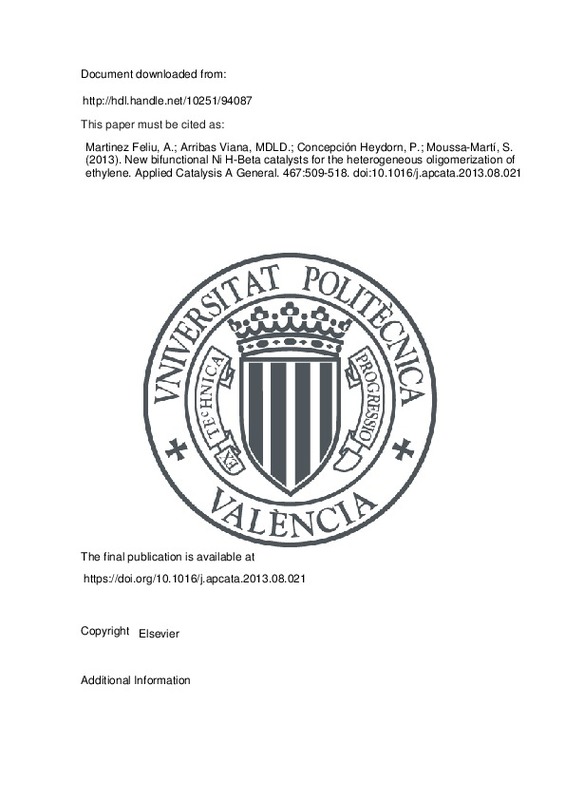|
Resumen:
|
[EN] The development of sustainable active and stable heterogeneous catalysts for the oligomerization of
ethylene to replace the unfriendly homogenous systems based on transition metal complexes currently
applied in the ...[+]
[EN] The development of sustainable active and stable heterogeneous catalysts for the oligomerization of
ethylene to replace the unfriendly homogenous systems based on transition metal complexes currently
applied in the industry still remains a challenge. In this work we show that bifunctional catalysts comprised
of Ni loaded on nanocrystalline zeolite H-Beta can efficiently catalyze the oligomerization of
ethylene with high stability and selectivity to liquid oligomers under mild reaction conditions. Ni-Beta
catalysts were prepared starting from a commercial nanocrystalline H-Beta sample with Si/Al ratio of
12 via both ionic exchange (1.0 2.5 wt% Ni) and incipient wetness impregnation (1.1 10.0 wt% Ni) using
aqueous Ni(NO3)2 solutions, followed by air-calcination at 550 ◦C. The Ni-Beta catalysts exhibited no signs
of deactivation under the studied conditions (T = 120 ◦C, Ptot = 3.5 MPa, PC2H4
= 2.6 MPa, WHSV= 2.1 h−1,
TOS = 0 9 h). The conversion of ethylene increased linearly with increasing Ni loading up to ca. 2.5 wt%,
irrespective of the method of Ni incorporation. Then, the conversion leveled off and attained a value
of ca. 87% at higher Ni loadings (impregnated series), concurring with the development of large, XRDvisible,
NiO crystallites sizing ca. 7 16 nm. Interestingly, the disappearance of Brønsted acid sites upon
Ni incorporation increased linearly up to Ni contents of ca. 2.5 wt% and then leveled off, thus paralleling
the activity trend. This fact indirectly suggests that Ni2+ cations replacing H+ in ion exchange positions
could be the active sites responsible for the activity of Ni-Beta catalysts. Direct evidence for the nature
of the active Ni sites was obtained from low temperature (−20 ◦C) CO adsorption and ethylene CO coadsorption
experiments followed by FTIR. CO-FTIR results ruled out the participation of Ni+ ions and
provided support for the assignation of ion exchanged Ni2+ species as the likely active sites in Ni-Beta
catalysts. Additionally, most active Ni-Beta catalysts displayed a non-Schulz Flory product distribution
with high selectivity to liquid oligomers (≥60 wt%) and high degree of branching due to the contribution
of the hetero-oligomerization pathway involving zeolite Brønsted acid sites.
[-]
|
|
Agradecimientos:
|
This paper reports work undertaken in the context of the project “OCMOL, Oxidative Coupling of Methane followed by Oligomerization to Liquids”. OCMOL is a Large Scale Collaborative Project supported by the European Commission ...[+]
This paper reports work undertaken in the context of the project “OCMOL, Oxidative Coupling of Methane followed by Oligomerization to Liquids”. OCMOL is a Large Scale Collaborative Project supported by the European Commission in the 7th Framework Programme (GA nº 228953). For further information about OCMOL see: http://www.ocmol.eu or http://www.ocmol.com. S.M. thanks ITQ for a predoctoral fellowship.
[-]
|







![[Cerrado]](/themes/UPV/images/candado.png)


